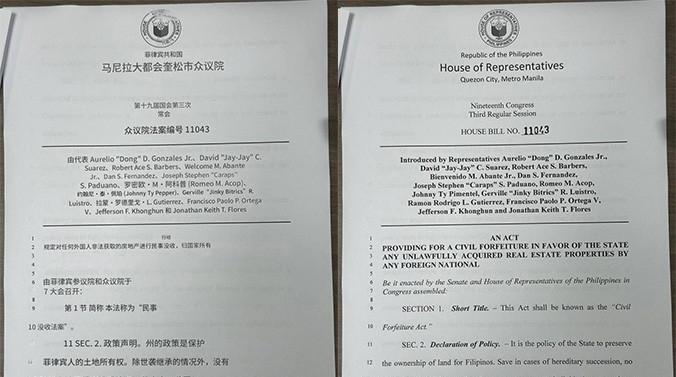Recently, the Philippine House of Representatives submitted a civil forfeiture bill (HB No. 11043), aimed at strictly combating the illegal acquisition of Philippine land ownership by foreigners, especially targeting foreign investors related to Philippine offshore gaming operators (POGO). The implementation of this bill will directly affect foreigners who purchase land through informal channels, including many Chinese investors, who will face the risk of asset confiscation in the future.
Background and Cause
In recent years, the rise of the Philippine gaming industry has attracted a large number of foreign investors, especially capital from China. However, the Philippine Constitution strictly prohibits foreigners from owning local land, so some investors have illegally obtained land ownership by colluding with corrupt officials and forging identity documents (such as birth certificates, passports, driver's licenses, etc.). Government investigations have found that many Chinese investors involved in the gaming business have purchased land in this way to establish offices and accommodation facilities.
In the past few years, due to the rapid development of the gaming industry, some Chinese have seen the appreciation potential of Philippine real estate, believing that this move not only provides operational support for the gaming business but also brings land appreciation. However, they often do not realize that these lands obtained through illegal means may face legal risks from land bills at any time.
So, what were the original provisions of the Philippine land bill?
Actually, the Philippine land bill has very strict restrictions on foreign land ownership. Philippine land is divided into agricultural, residential, and commercial land. The provisions for foreigners owning land mainly include the following points:
1. Direct ownership restrictions: Foreigners cannot directly own land, which is a basic principle explicitly stipulated by the Philippine Constitution. Whether individuals or foreign-funded enterprises, all foreigners cannot directly obtain land ownership.
2. Company-held land: If foreigners want to own land in the Philippines, they must hold land indirectly through companies registered in the Philippines. At least 60% of the shares of these companies must be held by Philippine citizens. This ensures that the control of foreign-funded enterprises is not entirely in the hands of foreigners and also protects the land rights of Philippine citizens.
3. Condominium unit purchases: Foreigners can purchase condominium units in the Philippines, but the proportion of foreign ownership in the entire condominium building cannot exceed 40%. This regulation aims to prevent foreigners from controlling the entire building by purchasing a large number of condominium units, protecting the housing rights of Philippine residents.
4. Long-term land leasing: Foreigners can use land through long-term leasing, with a lease term of up to 50 years, and it can be renewed for another 25 years after the lease expires. This method allows foreign investors to carry out business or development projects in the Philippines, but they do not have absolute control over the land.
In summary, foreigners cannot directly purchase and own land in the Philippines, and there are certain restrictions on investing in condominium units.
Content and enforcement strength of the new bill
To thoroughly clean up illegal land transactions, the Philippine government has formulated a civil forfeiture bill. The new policy stipulates that foreigners cannot own land, but there are still legal ways to acquire land:
1. Historical issues or inheritance: If the property was acquired before the 1935 Constitution, or through hereditary inheritance.
2. Condominium purchases: Foreign citizens can purchase units in condominium projects, but foreign ownership must not exceed 40%.
3. Company purchases: Foreigners can purchase land in the name of a company registered in the Philippines, but foreign shareholders must be kept below 40%.
4. Marrying a Philippine citizen: If married to a Philippine person, a foreigner can purchase land, however, the ownership must be registered in the name of the Philippine spouse.
The bill clearly states: Any land transaction obtained through false identity documents is considered invalid and has no legal effect. This means that once the bill is implemented, all land purchased through illegal means will face the possibility of being confiscated by the government.
The implementation of this bill will be jointly promoted by the Office of the Attorney General of the Philippines and the Ministry of Justice. For those foreigners who have already purchased land, especially Chinese investors, this means that past investments of millions or even billions of pesos may completely evaporate due to this policy. The law clearly states: Once illegal land transactions by foreigners in the Philippines are identified, the land ownership will revert to the state, with no compensation. The strict enforcement of this policy also exposes investors who were originally hopeful of taking chances to significant property losses.
Property risks and subsequent impacts for Chinese investors
As the bill progresses, some Chinese investors who have already purchased land have fallen into a predicament. The hot Philippine land market once attracted many investors, but under the current policy, these investments will face severe tests. Many lands purchased through informal channels may no longer belong to the investors themselves in the coming years. In addition, real estate involving the gaming industry will be strictly scrutinized, and once illegal activities are discovered, the confiscation process will be immediately initiated, and investors' losses will be unavoidable.
Many Chinese investors have obtained land with the help of local Philippine intermediaries through complex procedures. They not only paid high fees but also took great risks. However, with the implementation of the new bill, these assets will be directly affected. This incident also reminds other Chinese investors who are considering investing in Philippine land to strictly abide by Philippine laws to avoid irreparable losses due to illegal investments.
Future prospects: The plight and way out for Chinese investors
After the implementation of the new Philippine bill, many gaming enterprises and Chinese investors may choose to divest or seek opportunities in other countries with more lenient policies, such as Cambodia and Laos. However, for Chinese investors who have already invested, how to minimize losses and avoid confiscation risks will be a priority. If future policies allow, they may need to reacquire land use rights through legal means or transfer some assets to the legal leasing market to reduce legal risks.
Conclusion:
The civil forfeiture bill introduced by the Philippines sends a strong signal to all foreigners, especially foreign investors related to the gaming industry, who have obtained land ownership through improper channels: Foreigners are not allowed to have absolute control over Philippine land! For foreigners who have already purchased land, the new regulations may mean that they need to reassess and adjust their investment strategies to ensure compliance with the new legal requirements. Overall, this bill not only affects the future land purchasing behavior of foreign investors but also has significant legal and economic impacts on existing landowners, prompting them to make necessary adjustments within the legal framework. The implementation of this bill is not only a rectification of the gaming industry but also highlights the Philippine government's firm stance on land management.












